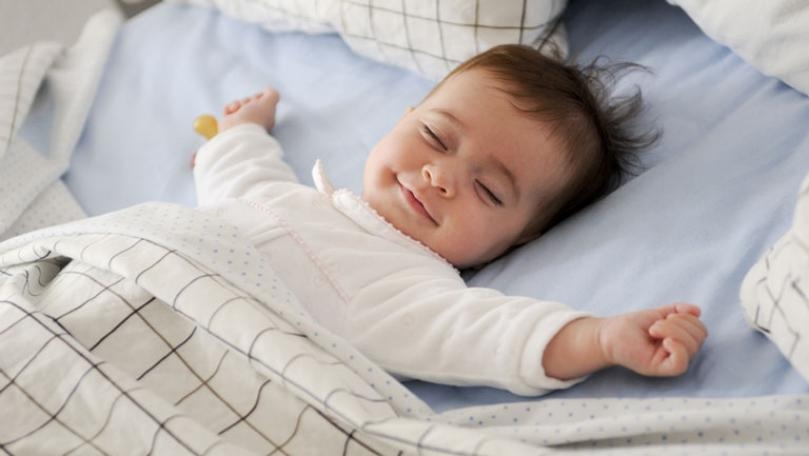TIME
New parents have a lot of tough decisions to make, and one of the most challenging involves their baby’s sleeping arrangements.
The American Academy of Pediatrics (AAP) currently advises parents to sleep in the same room (but not in the same bed) as their babies for a year, ideally, but at least for the first six months. Yet many pediatricians and parents find the guideline onerous. Not only are parents often awakened repeatedly throughout the night, but some infants also struggle to adjust to a new sleeping environment after an entire year.
In a new study published in the journal Pediatrics, researchers led by Dr. Ian Paul, professor of pediatrics and public health sciences at Penn State College of Medicine, took a close look at the effects that sleeping arrangements have on young children. They studied 249 pairs of moms and their first-born infants; nurses visited the moms at home when the babies were one, four, six and nine months old, and the moms answered detailed questions about their babies’ sleep habits, like where they slept, how often they woke up at night and their longest stretch of slumber.
Paul found that at nine months, babies who had slept in their own rooms before they were four months old slept on average 40 minutes more than babies who were still sleeping in their parents’ room at nine months. Babies who went to their own rooms after four months slept about 26 minutes more. The effects seemed to last, too. Even at 2.5 years old, the toddlers who slept with their parents for nearly a year were still sleeping less than those who had been moved to their own room earlier. “This decision in the first year has potential longer term consequences,” says Paul.
The findings suggest that the AAP guidelines, which condone keeping infants in their parents’ rooms for an entire year, may extend for longer than necessary. The AAP based its recommendation that newborn babies should sleep close to their parents on a number of different reasons, including that newborns need to feed throughout the night in their first few months. There are safety considerations as well. The risk of sudden infant death syndrome (SIDS), in which babies die for unknown reasons, often in their sleep, is highest for the infants under six months old; while fewer than 2000 infants die each year in the U.S. of SIDS, it’s the leading cause of deaths for babies one month to a year old. By sleeping in the same room with their babies, parents may be able to better monitor them and notice if their breathing changes.
But since the risk of SIDS declines after six months, other factors should be considered as infants gets older, says Paul, who believes the AAP guideline “over reached.” Waiting too long to move an infant to his own room can increase anxiety about sleep and disrupt a toddler’s sleep even more. He also notes that keeping babies close to the parents will increase the likelihood that dangerous behaviors, such as bringing the baby into the parents’ bed to soothe them, will occur. “Studies done on SIDS are done across the first year, and they found no difference between room sharing and independent sleeping once the babies got past 120 days, or four months,” he says. “The sleep location doesn’t really matter beyond that point.”
The AAP says that more data is needed on the subject of infant sleep arrangements but stands by its guideline for now. Dr. Rachel Moon and Dr. Fern Hauck from the department of pediatrics and family medicine at the University of Virginia School of Medicine supported the AAP’s guidance in an editorial accompanying the study. While they also note that more research on the subject is needed, they write that “the primary objective of safe sleep recommendations will always be to minimize the risk of SIDS and other sleep-related infant deaths.” They point out that in the study, even the babies whose sleep was shortened by sharing a room with their parents slept well within normal limits and were not considered sleep deprived. More studies are also needed to figure out whether long stretches of uninterrupted sleep for infants is a healthy thing, they say.
So where should new parents put their babies to sleep? Paul argues that at six months, parents should talk to their pediatricians about sleeping arrangements. Pediatricians should remind parents who decide to move their babies to their own rooms to make sure the new arrangement is safe by removing pillows, blankets, stuffed animals and bedding that can block infants’ breathing. It’s also important to share with parents that the data simply don’t support the need for room sharing after six months. “In this case the AAP just went a little too far,” he says. “For a variety of reasons the recommendation doesn’t make sense when you consider all of the adverse consequences that occur when the baby doesn’t sleep well and the parent doesn’t sleep well. It’s not good for baby and not good for the family.”









